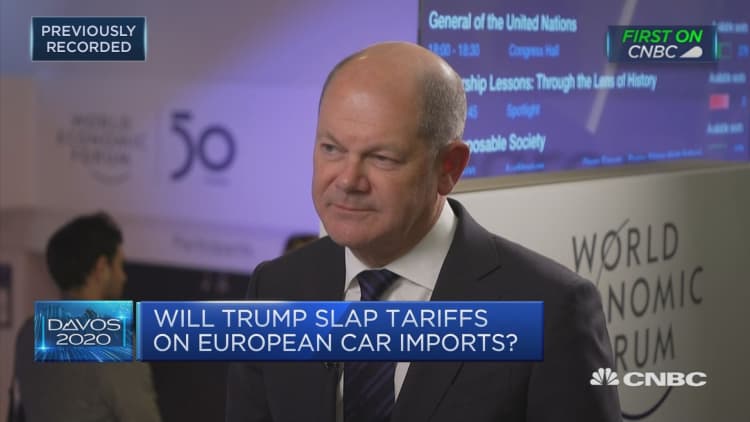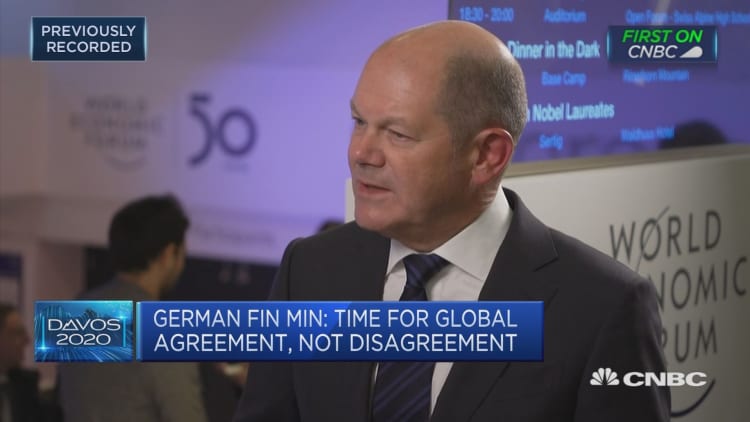
The German finance minister said he isn't pessimistic over threats of tariffs on the car industry as he believes an agreement on free trade and digital taxes is possible.
Soon after calling for a fresh trade deal with the European Union, President Donald Trump raised the specter of car tariffs should European nations implement a digital tax on big U.S. tech firms.
Trump's comments align with a similar warning from U.S. Treasury Secretary Steven Mnuchin, who said on CNBC panel in Davos this week that tariffs could come if EU members don't back off from their digital tax plans.
"If people want to arbitrarily put taxes on our digital companies, we will consider putting taxes arbitrarily on car companies," Mnuchin said Wednesday.
But speaking at the World Economic Forum in Switzerland on Thursday, Germany's Olaf Scholz told CNBC's Geoff Cutmore that he believes a free trade agreement with the United States will happen and he wasn't gloomy about the threat of tariffs.
"No, not really. I think we know that there is a need for debating about trade," said Scholz, adding that people "could be confident" that EU proposals currently on the table would lead to a deal.
"In the end, we know that trade is most successful if there are not too many barriers," he added.
Scholz said the digital tax, which would impact companies like Amazon, Google and Facebook, should be agreed globally and he expected an international proposal to come from the OECD in early 2020.
Countries have argued that current rules do not fairly match where digital profits are taxed, to the region where the income is derived. The OECD is currently working on a plan to introduce a multilateral solution which would come into play, replacing any individual taxes by different nations.
German surplus

Germany ran its biggest ever surplus in 2019, according to the country's finance ministry, hitting 13.5 billion euros ($15 billion) of income over expenditure, thanks to increased taxes and low interest rates.
The German economy grew at a paltry 0.6% in 2019, according to Destatis, the country's federal statistics office, prompting criticism of the Bundestag for refusing to stimulate demand in its own country. Instead, Europe's largest economy relies on other nations to import high-value goods from Germany's powerhouse manufacturing sector.
Domestic pressure has been growing on Chancellor Angela Merkel's government to start spending the cash on creaking infrastructure and end its commitment to its "black zero" policy of maintaining a balanced budget. In 15 years of leading the government, Merkel has never reduced taxes.
Scholz, who has said the surplus is down to "good economic management," said Thursday that the government has been part of a global effort to trigger growth.
"My view is that with the expansionary financial policy we had in the last few years, we did our job," said Scholz, who claimed that public investment in Germany was also at a record high.
The EU and International Monetary Fund have also called on Germany to spend more money to help stimulate Europe as a whole.
Scholz argued his government had taken the decision to support German industry in spending "many, many billions" in reforming both the energy and auto sectors.






